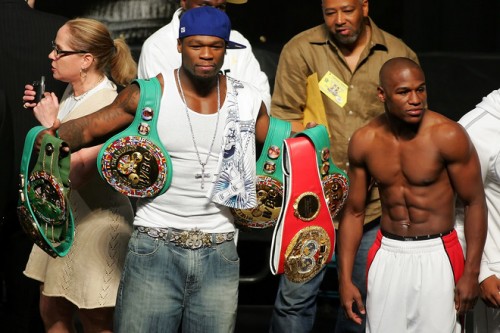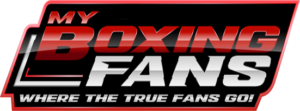For Mayweather, it’s not if, but who?

By David Mayo from the Ringtv.
If Shane Mosley feels even slightly frustrated at the lack of response to his frequent demands for a fight with the semi-retired/pseudo-retired Floyd Mayweather, he has his own similar lack of response over the last decade to blame.
That is not to say his requests are not being heard, or that they are failing.
The telephone rang late one night a couple weeks ago, before Mayweather’s sparring session in Las Vegas was reported and before the specter of his unspecified impending announcement this week was leaked. A source close to Mayweather’s situation was on the other end of the line. The source virtually is without peer in accuracy, short of hearing the words come from Mayweather’s own mouth, although the source’s name never has appeared in any story about the erstwhile pound-for-pound king. That’s how the source likes it. That’s how it will remain.
“Floyd’s definitely coming back. He’ll fight this year,” the source said.
Wow. Some news flash.
You’ve got do better than that.
“Floyd doesn’t like it that Shane’s calling him out,” the source continued. “It’s one thing when (Ricky) Hatton does it, or when (Manny) Pacquiao does it. But another African-American fighter calling him out is different.”
Now that’s something we’ve rarely considered.
Mayweather could make his comeback announcement this week. The insiders in his camp are tight-lipped about it. Calls seeking comment were not returned, which is not uncommon in Team Mayweather whenever something big is imminent. Few athletes so verbose can stay quiet so long about events so big.
Mayweather backed out of a reported speaking engagement at a charitable gig last week in Ohio, which his adviser, Leonard Ellerbe, used as a springboard for a declaration that an announcement this week would clarify the reasoning behind the pullout. (Actually, Ellerbe said more than a month ago that he had no idea how the initial reports of the speaking engagement were generated in the first place, and that Mayweather had no intention of appearing, which seems completely unrelated to the upcoming announcement, unless the comeback plans were well-hatched by then.)
My source also said HBO officials are aware of whatever Mayweather hopes to do, because they have been involved in preliminary talks with the fighter’s representatives about his plans.
Regardless of how it plays out, the yet-to-fail source indicated that Mosley may not realize just how well-positioned he is to lure Mayweather into a fight, whether immediately or sometime in 2010.
It might serve as a disadvantage to Mayweather that virtually every potential opponent for his comeback is under contract to Golden Boy Promotions or Top Rank. Golden Boy’s contracts with Mosley, Juan Manuel Marquez and Hatton might give the promotional company leverage to steer Mayweather into the fight it wants, particularly if Hatton wins his May 2 blockbuster against Pacquiao.
Mayweather’s other apparent potential comeback opponents, Pacquiao and Miguel Cotto, are with Top Rank. But long-running disagreements between Mayweather and his ex-promoter could render the Cotto proposal little more than yet another leveraging tool. Meantime, Pacquiao trainer Freddie Roach recently joined Top Rank chief executive Bob Arum in balking at a proposed Mayweather fight if their man beats Hatton.
Nevertheless, Mayweather’s free agency and proven pay-per-view marketability give him substantial negotiating power against all his potential opponents.
So does the reality that after 15½ months idle, and counting, the next opponent to get a shot at Mayweather probably has the best chance to defeat him. Even with Mayweather’s extraordinary skills, recovering his exquisite timing after such a lengthy respite figures to present a considerable internal challenge, perhaps beyond anything the erstwhile pound-for-pound king has encountered inside the ring before.
The dual opportunities to make more money than they could for fighting anyone except Oscar De La Hoya and to hang that first loss on a 39-0 record hold a unique cachet to fighters anywhere near Mayweather’s weight division. The first opportunity is a given. The second only holds true until someone actually does it.
Mayweather knows all this, of course, which makes Marquez a natural comeback opponent, although that proposal didn’t materialize until the Mexican’s scintillating victory over Juan Diaz last month. Marquez has fought only twice at lightweight, stopping Diaz and Joel Casamayor, and would have to move up more than a full weight division to secure a Mayweather fight. And that assumes Mayweather agrees to a catch weight, somewhere between junior welterweight and welterweight.
Marquez offers a presentable name for Mayweather’s resume — a mandate for fans who would not embrace a wishy-washy comeback opponent — although he is naturally smaller and a counter-punching specialist by nature. He is not slow, yet not exceptionally fast, so Mosley-like speed would not be an immediate comeback obstacle. Marquez also is not likely to pursue the attack with unfettered urgency, so Pacquiao-like aggession wouldn’t be an issue. It isn’t a fight we have seen before, which is the principal hurdle to selling Mayweather-Hatton II. What Marquez does possess is the ability to make mid-fight adjustments, as demonstrated against Diaz. But a mid-fight tactical disadvantage is something Mayweather encountered only once, in his first fight against Jose Luis Castillo, a career transitional moment after which he became a better and more complete fighter.
Considering all those factors — and the high probability that any comeback by the 32-year-old Mayweather will not be for just one fight — Marquez’s availability, willingness, size disadvantage and clear underdog status might give him an inside track as the comeback opponent.
Mayweather’s late-hours call to family members in Michigan after Pacquiao dismantled De La Hoya last year — in which he breathlessly asked a cousin whether his father, Floyd Sr., might be interested in co-training him for a clash with Pacquiao — betrayed his interest in fighting again. Ellerbe confirmed it days later, when he said his boss had empowered him to engage fight talks. Pacquiao inherited the pound-for-pound mantle when Mayweather abdicated it. A desire to regain that distinction in a single fight could spur Mayweather toward that intriguing clash.
But Mosley also probably worked his way onto the comeback list after a decade of cat-and-mouse games that ultimately deteriorated into a futile tail-wags-dog effort as his career losses (now five) mounted.
Mayweather-Mosley undoubtedly would be an intriguing fight and very well might happen, even if it makes little sense for Mayweather to embark upon such a challenge immediately, given Mosley’s recent activity and sharp stoppage of Antonio Margarito in January. Still, at 37, Mosley is given to uneven performances, as evidenced by his sluggish stoppage of Ricardo Mayorga last year, preceded by his loss to Cotto. Mosley seems very much like Roberto Duran at an advanced age: He is infinitely beatable, though it takes a quality fighter to achieve it, and no one wants to catch him on a good night.
Mosley’s disadvantage is that whenever the fight made sense for Mayweather, he almost always balked. One night in 1999, Jack Mosley said his son would need $10 million to fight Mayweather. That same night, Mayweather earned a $150,000 base purse for defeating Carlos Rios. Two months later, Mosley couldn’t sell out a casino venue in the California desert for a lightweight title defense against John Brown. Later, as Mosley hit his career zenith with two wins over De La Hoya, he never even considered Mayweather.
Mayweather’s recent $20 million demand to fight Mosley wasn’t so much a lack of market understanding during tough financial times as a backhanded response to the Mosleys’ laughable $10 million demand a decade earlier.
Mayweather also still chafes at Mosley’s reluctance to fight him in 2006. Mosley was fresh off a victory over Fernando Vargas that reestablished him as a marketable force after four losses, two each to Winky Wright and Vernon Forrest. But Mosley wanted to take time off instead, ostensibly to allow his promotional boss, De La Hoya, to negotiate a fight with Mayweather that wouldn’t materialize for nearly another year. Mayweather-De La Hoya talks were balky from the start and there was no certainty the fight would materialize at the time of Mosley’s reticence. Mayweather hoped to fight Mosley first, then De La Hoya, but ended up with Carlos Baldomir as his interim opponent instead.
Mosley finally acceded to the fight only after it made no sense for Mayweather, who went on to fight Hatton instead, while Mosley further diminished any potential for their fight by losing to Cotto.
Two years ago this month, in a quiet conversation at his Las Vegas gym, Mayweather talked about how badly he needed to get away from boxing. The two most lucrative fights of his career, against De La Hoya and Hatton — not to mention Dancing With the Stars and WrestleMania — loomed in front of him. By the time he finally wanted to walk away from a lifetime in boxing, without a substantial break, he couldn’t.
Now, with a gaudy lifestyle and unsatisfied IRS liens of more than $7 million against him, his comeback seems imminent. The tax liens are not uncommon — he has had 10 such liens filed against him the last five years, roughly corresponding with his evolution into a pay-per-view magnet, which may not be optimal business practice, though it established a discernible pattern — but the flash and panache require constant fiscal feeding.
That, and shared heritage, may be Mosley’s biggest advantage in securing a fight with Mayweather, according to my source.
In the 10-plus years since Mayweather won his first world championship bout, over Genaro Hernandez, he fought only one title bout against a fellow black American — Zab Judah, who controlled the first four rounds of their 2006 fight before Mayweather took control. Mayweather’s only other fights against African-Americans during those years were non-title bouts against Emanuel Augustus and Demarcus Corley, both of whom had some good moments against him.
Fact is, few African-Americans ever called out Mayweather, save for those it made no sense for him to fight.
Judah got his chance after years of wrangling, despite nearly blowing the proposition with his untimely loss to Baldomir in the bout immediately preceding his loss to Mayweather.
Winky Wright called out Mayweather, though weight and money gaps doomed those talks quickly. Paul Williams faces similar divisions in pursuing Mayweather today, though a willingness to move freely between weight classes could help narrow them if he defeats Wright next month.
Wright himself last year noted the belief that African-Americans have “different styles” from the “face-first” opponents most fight fans and journalists tend to embrace.
“Boxing is supposed to be an art,” he said. “Black fighters, we’ve got style. We’ve got pizzazz.”
Whether that is enough to make Mayweather-Mosley immediately is questionable. But if such oddly artful perceptions help to strike a deal before the fight’s expiration date, who cares about the motivation?
David Mayo covers boxing for the Grand Rapids (Mich.) Press. He has covered Mayweather since he fought as an amateur.


mosley demanded 10 mil to fight floyd in 1999? who told you that – floyd? watch the end of both the manfready fight and rios fights on youtube. this was just before shane moved up. In both he states he has no desire. In fact In april of 1999 Katz of the daily news wrote an article stating that floyde did not want mosley and that he wanted to break records for most defences. may 1999 mosley already had a fight sched at a higher weight.
Comments are closed.